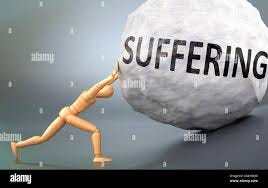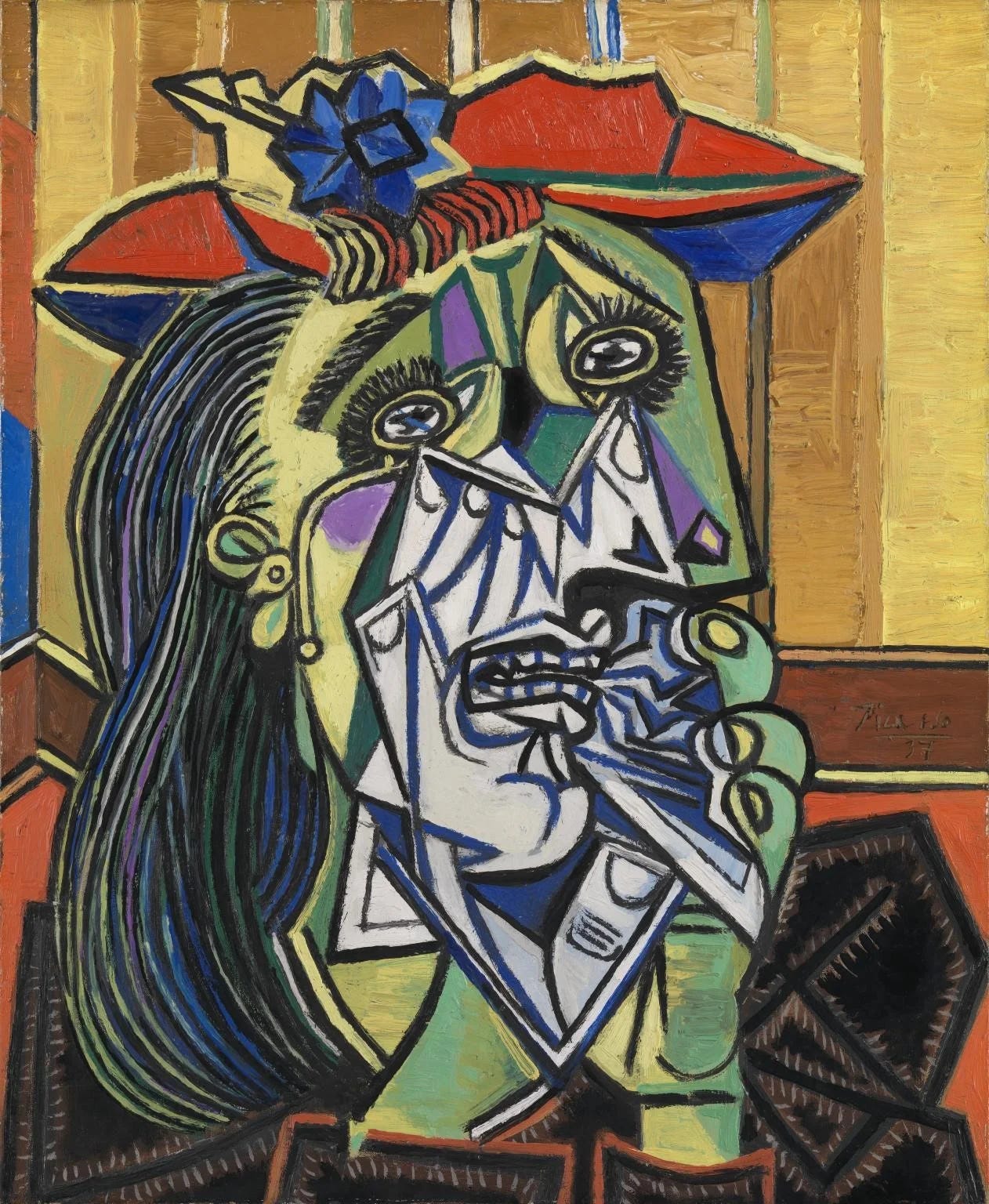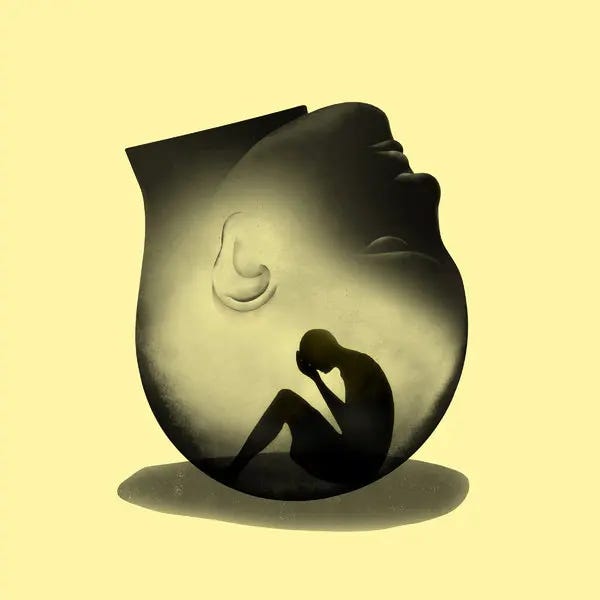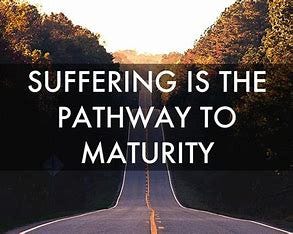WHAT IS SUFFERING?
It was 1974, I was 18 years old wearing dusty boots, work gloves, a straw hat, a white long-sleeve shirt, red face scarf, sunglasses, and worn-out jeans.
Gazing into the blazing mid-summer Central California sun, I wiped the sweat from my forehead and started walking West, alone, with hoe in hand, down an endless row of tiny cotton plants.
My job was hoeing weeds between cotton plants that were spaced about one foot apart.
From North to South, rows of green weed-infested cotton seedlings extended in both directions.
I was on a 9-hour clock, and it was getting hotter.
I recall asking myself why I was working at this, six-day a week, no-count $6.00 an hour job.
This is a story of suffering.
I’m sure you have similar stories.
I can’t directly connect to your personal suffering, but
I do know that whatever your suffering is (or was), it was painful because
(suffering = pain).
Suffering is Humanity’s Common Ground
It’s hard to describe one’s sense of suffering.
I know because I’ve tried.
COVID
You see a doctor. You are in pain. Your body is burning up. Profoundly tired, you have a high temperature, and your head aches. You are struggling to breathe. You feel sharp, stabbing pains in your chest when you breathe, you have stabbing aches all over, and are sure you’ve been thoroughly infiltrated, including your brain.
You are suffering.
The doctor looks at you and may order albuterol breathing mist or, if you came early, Paxlovid. Your PCP might listen to your lungs, take one or more X-rays, and confirm that your lungs are filled with fluid.
You are admonished to go home and “rest.”
The doctor leaves. There’s nothing more that can be done. Soon, you’re heading home with the warning not to interact with anyone until you are no longer contagious.
From your doctor’s POV, you have a COVID diagnosis. From your POV,
YOU ARE SUFFERING.
Perhaps you hoped for more from your doctor, some understanding or kind words. Time is short in the clinic; if you received these, it’s unusual, plus everyone else is sick and what makes you so special.
I’ve described COVID suffering because, like you and me, a lot of people contracted COVID and, as a consequence, have suffered.
There are many other ways to suffer. Physical illness is one.
The truth is that COVID suffering is pervasive.
We think we know what suffering is, and what it means.
Suffering is not just pain, arduous and awful as that is. It is more than pain, but pain is part of it.
What is Suffering?
Most of us know what the word, “suffering” means.
Be that as it may:
Merriam-Webster defines suffering as: (transitive verb) 1a: to submit to or be forced to endure, 1b: to feel keenly: [as in] labor under, [or] suffer thirst… (intransitive verb) 1: to endure death, pain, or distress, 2: to sustain loss or damage, and 3: to be subject to disability or handicap.
The American Psychological Association Dictionary defines suffering in this way: (n.) …the experience of pain or acute distress, either physical or psychological, in response to a physical trauma or a significant event, particularly one that is threatening or involves loss (e.g., the death of a loved one).
These definitions converge around two themes
pain or acute distress
loss
It would be hard to argue that suffering does not involve painfulness, distress, OR that it does not follow loss.
Still, reducing suffering down to these features misses its phenomenology or
the experience of suffering.
Great literature can clarify the nature of suffering.
In Sylvia Plath’s The Bell Jar, she describes emotional suffering as the profound disconnect and despair one feels when one is caught in the grasp of mental illness. She uses a “Bell Jar” metaphor to capture this:
“To the person in the bell jar, blank and stopped as a dead baby, the world itself is the bad dream.”
Sylvia Plath’s The Bell Jar is a story of suffering.
As a writer, Plath suffered. I’m sure she suffered while writing her story. I suffered as I read it.
In an early passage, when the story’s protagonist is soaking in her NYC apartment bathtub, her thoughts about herself, open and relaxed, move back and forth, she notes,
"I never feel so much myself as when I'm in a hot bath…" I knew at the moment I read this scene, how the book would end.
It was a profound feeling for me, so profound that I had to put the book down and come back to it later because I knew the ending would be tragic. I wanted, at that moment, to save her from herself, but I couldn’t because this was just a story.
I was glimpsing her suffering.
Some time after writing The Bell Jar, Plath ended her own life (found with her head in a gas oven). This outcome, for Plath, I would have predicted if her story were true. The story as told in The Bell Jar could not have been fabricated. It was pure truth on the page. Truth in the sense of suffering.
Some have suggested that “The Bell Jar” was autobiographical. It tells the story of a young girl who goes off to seek her fortune and with hope and interest, travels to NYC with its glitz and ugliness, has mixed experiences, some good, some bad, and some tantalizing, all personal.
The POV is from a young girl/woman’s internal experience living alone in a big world. It is a story of psychic shifting from bad to worse as she ultimately ends up in an impersonal mental institution, diagnosed with an intractable mental illness.
It is a simple first-person storyline.
The writer (Plath) describes early excitement, anticipation, curiosity, but this eventually morphs into dread and hopelessness, turmoil, and finally, a kind of tough resignation as she tumbles down the vortex of mental illness.
Perhaps Plath, herself, was burdened with mental illness from the beginning, but this is not obvious as the story unfolds.
A book worth reading to understand suffering.
Job (from the Bible) is perhaps the best-known Western religious text that describes the suffering of man under God’s (or Yaweh’s) hand.
Job 6: (4) “For the arrows of the Almighty are within me, the poison wherof drinketh up my spirit: the terrors of God do set themselves in array against me.”
Job 7: (KJV), (4) “When I lie down, I say, When shall I arise, and the night be gone? and I am full of tossings to and fro unto the dawning of the day.” (5) My flesh is cloted with worms and clods of dust; my skin is broken and become loathsome…
Job’s suffering is a mixture of physical and existential pain. The physical pain is probably endurable, with death being the end result.
Job was a tough character, and he could endure intense physical pain. The “existential” pain and suffering were more difficult, so difficult, in fact, that Job almost broke under it. To be cut off from the Divine for reasons he could not fathom.
As the story goes, Job was true in every way. Why was God acting in such a vindictive and almost evil way? Job felt there must be a reason for it, but he couldn’t understand.
There was, indeed, a reason. I’ve shared my POV of what this reason was in a previous entry under the “Devil,” but it is a complex explanation, likely beyond what Job, at that time, could grasp.
The elements of Job’s suffering that were so difficult to bear was his growing hopelessness and a sense of disconnection from God (and others) that grew along with Job’s questions about why God had seen fit to punish him. The theme is similar to the disconnection described in Sylvia Plath’s The Bell Jar. Job’s sense of Loss is profound.
SUFFERING AND MENTAL HEALTH
Mental Health suffering, of which elements are found in “The Bell Jar” and in “Job” is special, including its ironic and existential features.
What is it like to suffer from Depression or Anxiety?
What is it like to suffer after a profound trauma?
How is mental health suffering different (or the same) than physical suffering?
These questions arise because almost everyone suffers from time to time under the weight of mental health “concerns.”
Not everyone experiences chronic mental illness, but we are all vulnerable to its effects. The only difference is that once a negative emotional state takes hold (low mood, anxiousness, panic, fear), most of the time it goes away (or resolves on its own).
Once in a while, it doesn’t, and when it doesn’t, then chronic mental illness emerges (depression, anxiety, Panic Attack, paranoia) with the special case of suffering that it engenders. Suffering that, as its more extreme, can influence a person to self-harm, if only as an ironic form of relief.
A client once told me once that suffering from chronic depression, in her case, was like throwing a “wet” and “cold” blanket over herself. The blanket sucks out your energy, your contentment, and any sense of stability and safety (irony - a blanket should keep you warm and safe unless it is wet and cold).
The longer you are under it, the worse you feel.
What does it feel like to be caught up in a persistent and fast cycling, ruminating mental health condition? Perhaps the rumination is tied to a traumatic memory you will never forget.
What kind of suffering does one experience when one believes that other people or institutions are looking to harm them?
What kind of suffering does one experience in grief that never remits, and only gets worse or darker.
What kind of suffering does a person experience when they feel profound guilt or worse, shame, but are unsure what they did to cause these feelings and, worse, not knowing how to address them?
What does it feel like, in schizophrenia, when your whole world seems like an unending bad dream? You are in the “Bell Jar” and the lid is locked tight.
A person in the throes of a mental illness condition once conveyed to me that he (or she) felt like they were in a rowboat rowing hard in a fog, desperate to find land, but not sure which direction land was, so the harder they rowed, the further from land they became.
NOT KNOWING IS SUFFERING
Mental Health suffering is a special case of suffering associated with not knowing (and not understanding) why one feels the way one does. Mental health suffering is associated with the following points of view (POV):
Disconnection and abject loneliness in the presence of psychic pain.
Uncertainty about recovery and a tendency to believe that things will get “worse,” not better, with time.
Panic that is associated with impending doom and a belief that unending despair is connected to suffering.
A sense of foreboding guilt that there was something the person did that is the root cause of their suffering.
A profound sense of shame that the person no longer has (or maybe never had) a meaningful place in their everyday social world.
This POV is different than, for example, physical suffering, where there is usually an understanding (due to the physical disease course) of the connection between bodily pain, discomfort, and recovery.
FINAL WORDS
In COVID, physical suffering emerges from within a constellation of symptoms, mostly explainable as part of the physical viral disease. Words for physical suffering are: bodily itching, tiredness, burning fever, aches and pains, which are believed to be your body addressing the disease to help you feel better.
Suffering, in this regard, is a predictable and meaningful part of illness recovery.
Even chronic (and sometimes lethal) diseases or physical illness conditions like cancer, heart disease, diabetes, and the like have an understood pathophysiology that most people sense as the underlying cause of their suffering.
Support in the form of medicine, surgery, or other interventions is applied to help your body address the disease and is therefore “purposeful” and “meaningful.”
MENTAL ILLNESS IS DIFFERENT
Not so with mental illness conditions. Explanations about the course of mental illness from the medical fields such as psychiatry (and to some extent, psychology) have an ongoing mystery associated with them.
The cause of mental illness is linked to ambiguous brain (or neurochemical) processes, troubled early life history, or vague and unalterable genetic sequences.
Drug prescribing, at best, is hit and miss.
Other interventions (ECT, Magnets, Rest, Meditation, CBT, Psychoanalysis) are diffuse and poorly understood, if they are effective at all.
This ambiguity opens the door to personal conjecture that somehow you are at fault for your suffering. This POV tends to make the quality of suffering more intense, personal, judgmental, and profound.
The “cures” for mental illness, at best, are presented palliatively or to delay the inevitable return of the mental illness (if it ever left).
Some treatments (ECT) carry a stigma that your condition is not treatable unless some drastic, ambiguous action is taken. For drug treatments, once you start a regimen, the unwritten expectation is that you will stay with it for the rest of your life.
No one, by conjecture, is cured of depression or anxiety, or trauma, or the like. Our best societal (and scientific) approach to mental illness is long-term management, loosely defined, with some elusive and nebulous hope that the mental health condition (PTSD, for example) will somehow “go away.”
When (or if) this doesn’t happen, drugs or psychotherapy are applied, and with time and perhaps some good luck, the person is supposed to find a way to manage their symptoms (but the disorder itself will not be “cured”).
This scenario is not a recipe for genuine hopefulness or a positive future outlook if one is diagnosed with a mental health condition, and it tends to amplify an individual's state of suffering.
Think of Job, whose ability to tolerate physical suffering was great, but the mental/emotional anguish of disconnection from God and others was intolerable.
I could create a section on how to deal with (or somehow diminish) your suffering. This list might be long or short, but it would contain affirmations like:
Acknowledge its presence (suffering). Accept that it’s a part of life. Find healthy ways to cope, like mindfulness and social support, etc, etc.
I’m sure you’ve heard this litany of suggestions before, and if you desire such assistance, it is available on the internet or from your primary care provider.
My approach to this, instead, focuses on what suffering is.
Why are we exposed to so much emotional suffering within ourselves and others?
Everyone would agree that maturation is not possible without resistance.
Suffering is no more and no less than our human reaction to this resistance.
If we feel sad, the suffering we experience is our resistance to the sadness.
Suffering is the feeling of “difference” between, for example, sadness and happiness.
If we didn’t know what it was like to feel happy, we would not suffer when we are sad.
The limbo/difference/desire between two states that we know exist (sadness versus happiness) is “suffering.” That’s why “suffering” is tough to describe. That’s why Job suffered.
We want to feel happy, but we are sad.
In desiring this “happy” state, we are confronted with being stuck in sadness - mind you - by a force that pushes against our psychic movement towards happiness.
That force is suffering.
Think about it. When you suffer, you want to be “free from sadness” or liberated from being sad. You want to be “happy.” This is the goal. But, you are stuck, and this “pushing against force” (resistance) that’s causing you to feel stuck is different from the sad state you are in, but it’s also not happiness. In fact, at the early point it might be amplifying sadness. However, suffering is NOT sadness.
The force itself (resistance) is not “painful”; the sadness is painful. The sticking force is the basis of your suffering.
The equation Suffering = Pain X Resistance is an idea that can put meaning into suffering.
What I’m suggesting when you suffer is not to focus on reframing your “sadness” per se, but to focus on your “suffering” itself.
Why? Because if you can reduce the resistance (suffering) force, then you can move to another emotional state. In this case, from sadness to happiness.
As a therapist, I focus on people’s suffering versus their sadness because in understanding the nature of their suffering (in Job’s case, suffering was Job’s being held (in this case, by God) from connection with God (in this case, God was the resistance, not Job). Sadness was an emotional state that Job was experiencing, but worse than the sadness, Job was stuck (or held) in it (painful as it was) by a seemingly ethereal but real force, which is suffering.
Job pleaded with God to lighten the resistance that was pushing against Job’s desire to feel Joy versus Despair.
The resistance was Job’s suffering. In this case, sorrow was not the consequence of Job’s condition; it was the resistance from Joy, or the force that was holding Job back from moving out of his disconnected state of limbo from God to a sense of connection with God.
In the end, Job figured this concept out and acted on it. God was unable (according to the story) to tempt Job into despair and hatred of God, no matter what God did (or tried to do).
So, in the very end, God relented, Job got everything back that was lost (and more), but Job didn’t need to get everything back because he was at peace with himself in whatever condition God sought to put him in. Job had worked through his suffering.
I realize that this is a complicated idea.
Still, I have had success in focusing on a person’s suffering (versus alleviating the pain associated with our human condition) and how the suffering as a force of resistance impedes one’s ability to change one’s emotional feeling state. To negotiate with the power of suffering (or this resistance) is what it means to
MATURE
With these thoughts, I end the entry.
Should enough readers find interest in this idea, I will write a follow-up blog entitled.
(Reframing suffering to free yourself from psychic pain).

















